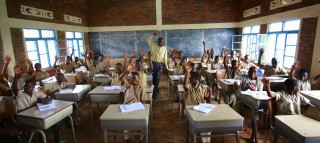A secondary school in the Ruyigi province of Burundi sent home 230 students on Tuesday for defacing the portrait of President Pierre Nkurunziza in their textbooks. Kwizera Guillaume, the provincial director of education reportedly said the students sent home are from four classes and that they are currently sitting for an exam. “It is an option we took to push them to reveal the authors of the acts,” he told Reuters by phone.
Earlier this month, police clashed with students protesting the arrest of other students for a similar offense of defacing the president’s portrait in Muramvya, which is 50 km east of Bujumbura. Another 300 students were sent home by their school in Bujumbura for defacing portraits of the president.
While one cannot rule out the fact that these recent developments are a cause for concern, President Nkurunziza made himself an easy target in the first place by clinging to power. The youth of any society do not occupy a remote perch outside their social environment, and as they witness the embarrassment Burundi has become under his leadership, for some, the temptation to speak up becomes too difficult to resist.
Youths mirror the ramifications of the society within which they live. Certainly, not all will protest for reasons like sharing certain class and group loyalties. However, the section feeling the pinch of the economic hardship and collapse of civility in Burundi will definitely engage in the struggles for the realisation and defence of concrete social ideals and interests.
Satire is meant to comfort the afflicted and afflict the comfortable, but if Nkurunziza lacks the temperament to handle criticism from secondary school students who are united enough to suffer together for criticising the government, then that raises a lot of questions about his leadership qualities. Holding public office and expecting total compliance and exemption from reproach is delusional, even in the many infant democracies across the continent of Africa, satirical works albeit a mockery of authority. The revered are tolerated because they are a reflection of the thoughts and needs of a section of the society.
Rather than be occupied with teenage business, the youth seem to have made a conscious decision to question what is happening, possibly because they are insecure about their future. A good move could have been to counter youthful exuberance and agitations by highlighting the achievements it has made as well the policies implemented in their interest.
Where education meets the dynamism of youth, there is an existential threat to governments wallowing in incompetence. Burundians, like the students, must unite and call for the school to allow the students back into the school and have them take any exam they might have missed, because their oversight role is a necessary discomfort for the government, one the government needs to strive better for.
It is the young trees that make up a forest. If the people of Burundi allow the Nkurunziza-led government to decimate the fighting spirit of Burundi’s youth, especially the educated ones standing up to the government, the country risks becoming a nation ruled by spineless leaders in the future when these youths become leaders. They will not be enough to challenge non-state actors, multinational companies or countries acting against the interest of the people of Burundi; issues which are legitimate concerns in the globalised world we live in today. They are also more likely to employ the same tactics on future generations who rebel against injustice.
In recent times Burundi has been in the news for all the wrong reasons. More than 450 people have been killed since President Pierre Nkurunziza won a third term against the will of a section of the country. An incident which motivated those bold enough, to take to the streets to express their dissatisfaction, this opposition has said his reelection violated the constitution and a deal that ended a 12 years civil war in 2005.
Whether the youth are allowed to exercise and develop their political consciousness or not, their future and the common destiny of all of Burundi depends on it.








